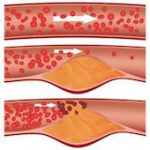 Moderate alcohol consumption lowers the risk of atherosclerosis. This happens through beneficial changes in lipid profiles and inflammation. That is the conclusion of a meta-analysis that was recently published in the scientific journal Wiener Klinische Wochenschrift.
Moderate alcohol consumption lowers the risk of atherosclerosis. This happens through beneficial changes in lipid profiles and inflammation. That is the conclusion of a meta-analysis that was recently published in the scientific journal Wiener Klinische Wochenschrift.
What is already known? Alcohol has both beneficial and detrimental effects on cardiovascular disease, including atherosclerosis, depending on the amount and frequency of consumption. Moderate alcohol consumption is associated with a lower risk of cardiovascular disease, while heavy consumption increases the risk. This results in the so called J-shaped curve.
What does this study add? The mechanism by which moderate alcohol consumption protects against atherosclerosis is still unknown. This meta-analysis looks into the association between moderate alcohol consumption and biomarkers that are associated with atherosclerosis.
Atherosclerosis
Atherosclerosis is a chronic inflammatory disease. Fatty particles, such as cholesterol, can be deposited on the artery wall and form a plaque. When the plaque builds up, the artery is narrowed and reduces the blood flow and the supply of oxygen to the cells1.
Biomarkers
Indicators for atherosclerosis are the ratio between LDL- and HDL-cholesterol, triglycerides and several inflammation markers; these are so called biomarkers. The researchers analyzed 31 experimental studies with in total over 1250 patients and concluded that moderate alcohol consumption positively influences certain biomarkers2. Results show that the ratio between LDL- and HDL-cholesterol is improved. Also the inflammation marker interleukin 6 is decreased with moderate alcohol consumption. Other biomarkers, such as apolipoprotein A I and fibrinogen are beneficially influenced by moderate alcohol consumption. These changes in biomarkers contribute to a lower risk of atherosclerosis.
Causality
The meta-analysis indicates that moderate alcohol consumption has a positive effect on several biomarkers that are related to the risk of atherosclerosis. The researchers concluded that moderate alcohol consumption is causally related to a lower risk of atherosclerosis.
Strengths of this study
• The underlying mechanism is investigated; therefore, a causal relationship can be indicated.
• There is no evidence of so called ‘publication bias’ (the fact that negative or contradictory results are less likely to be published).
Limitations of this study
• The included studies vary in design and analysis of the biomarkers.
• The included experimental studies are often short term trials (1-8 weeks).
• Moderate alcohol consumption is not defined in the meta-analysis. The definition of one glass is 12.5 g alcohol.
References
1. American Heart Association; Conditions – Cholesterol – Atherosclerosis. Accessed on: 18-09-2017
2. Huang, Li, Y., Zheng, S., Yang, X., Wang, T., en Zeng, J., Moderate alcohol consumption and atherosclerosis: Meta-analysis of effects on lipids and inflammation, Wiener Klinische Wochenschrift, 2017.
